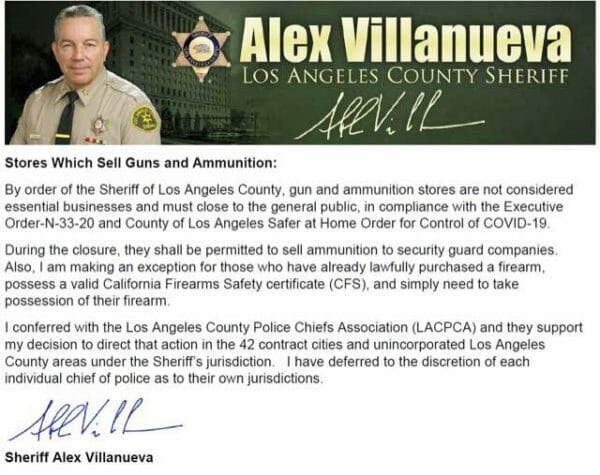
U.S.A. –-(Ammoland.com)- The Sheriff of Los Angeles County in California, Alex Villanueva, has backed away from his emergency order closing gun stores. This is the second time he has done so. This time he gives the Trump Administration the credit for opening the stores. From ktla.com:
He said the move was prompted by memorandum issued by the U.S. Department of Homeland Security on Saturday that designated workers supporting the firearms and ammunition industry to be “essential infrastructure” workers.
“Based on further input from the federal government, the Los Angeles County Sheriff’s Department will not order or recommend closure of businesses that sell or repair firearms or sell ammunition,” Villanueva said in a written statement.
The sheriff said that while the Department of Homeland Security guideline was an advisory only, “…nonetheless, the federal memorandum is persuasive given the its national scope.”
On 24 March, 2020, the Sheriff ordered gun stores in Los Angeles County closed, as “non-essential businesses”.
Then the Count Council ruled that gun shops are essential.
Then on 25 March, 2020, Governor Newsom refused to clarify whether he believed gun stores were essential or not.
On 26 March, 2020, Sheriff Villanueva ordered gun shops closed to the general public, but open to security guard companies, and available for people who already purchased a gun, under California’s 10 day waiting period, to take possession of the gun they had paid for.
Several organizations that support the exercise of Second Amendment rights made statements about the likelihood of filing lawsuits against Sheriff Villanueva.
On 28 March, 2020, the Trump administration declared workers at gun stores and gun ranges to be essential and critical. From cisa.gov:
Workers supporting the operation of firearm or ammunition product manufacturers, retailers, importers, distributors, and shooting ranges.
On 31 March, 2020, Villanueva rescinded his order from 26 March.
On 15 March, 2020, there had been a run on gun purchases all over the country. California is one of the few states that prevent purchasers from taking their firearms home with them after they have paid for them. In California, purchasers must wait 10 days to take possession of their guns, even if they already possess guns, or if they have a concealed carry permit.
The law was found to be unconstitutional, at least for people who already own guns and/or have a concealed carry permit, in 2014. The case was appealed to the Ninth Circuit, which reversed the finding in 2016. The case was appealed to the Supreme Court. In 2018, the Supreme Court refused to grant a writ of Certiorari (hear the case).
Waiting periods for the purchase of firearms are controversial statutes. There are no academic studies that show them to reduce violent crime. From the Crime Prevention Research Center amicus brief in the case:
Despite assertions that the benefits from waiting periods and background checks are obvious, the complete lack of empirical studies to support those claims is stark. No evidence is offered that either of these laws reduce violent crime, nor that they reduce overall suicide rates. Even more striking, the discussions that Appellant and amici use are not relevant to the case before the court.
Those who claim the mere existence of firearms in society is harmful to treat their assertion as obvious. There is much evidence that arms in society have significant benefits.
Aside from purely pragmatic arguments, no other fundamental, enumerated right in the Constitution is treated with as much disrespect as the Second Amendment.
About Dean Weingarten:
Dean Weingarten has been a peace officer, a military officer, was on the University of Wisconsin Pistol Team for four years, and was first certified to teach firearms safety in 1973. He taught the Arizona concealed carry course for fifteen years until the goal of Constitutional Carry was attained. He has degrees in meteorology and mining engineering, and retired from the Department of Defense after a 30 year career in Army Research, Development, Testing, and Evaluation.
